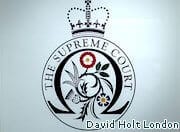The UK’s highest court has today dismissed an appeal to allow doctors to assist in suicides.
The case involves the family of Tony Nicklinson – who died in 2012 and could only communicate by blinking and nodding – and Paul Lamb, who is paralysed.
Judges also rejected an appeal by a man with locked-in syndrome, known as ‘Martin’, who wanted to legally be helped to travel to the Dignitas clinic in Switzerland to end his life.
Prosecution
The lawyers for ‘Martin’ argued that the Director of Public Prosecutions’ guidelines are insufficiently clear as to whether someone who is not a close friend or relative would be charged if they helped him to kill himself.
Lamb, and Nicklinson’s wife, had argued that the Suicide Act 1961 goes against human rights laws, and should include a “defence of necessity”.
But today judges ruled 7-2 to reject their appeal. The majority decided to defer the issue of changing the law to Parliament.
Normalisation
One of the judges, Lord Sumption, pointed out in his judgment that legalising assisted suicide “would be followed by its progressive normalisation, at any rate among the very old or very ill”.
He added that “in a world where suicide was regarded as just another optional end-of-life choice”, the pressure on the vulnerable and those who feel they are becoming a burden on others to kill themselves is “likely to become more powerful”.
Care Not Killing (CNK), an alliance of pro-life groups opposing assisted suicide and euthanasia, intervened in the case.
Welcomed
Dr Andrew Fergusson, a spokesman for CNK, said the group welcomed this judgment.
“The law in England and Wales remains unchanged, with the Court recognising that it exists to protect vulnerable, elderly and disabled people. This is why Parliament has debated and repeatedly voted against changing the law in recent years.”
“The current law exists to protect the vulnerable and those without a voice: disabled, terminally ill and elderly people, who might otherwise feel pressured into ending their lives.
Changing
“It does not need changing – a fact recognised by the High Court, Court of Appeal and now in the Supreme Court ruling”, he added.
Lord Falconer’s assisted suicide Bill has its second reading in the House of Lords on 18 July.
His Bill seeks to change the law to allow terminally ill patients to obtain lethal drugs to kill themselves.
The Bill would not have applied to the Nicklinson and Lamb case, as those involved did not have a terminal illness.


